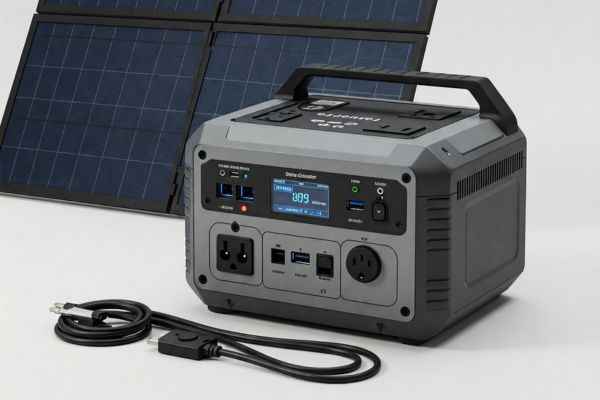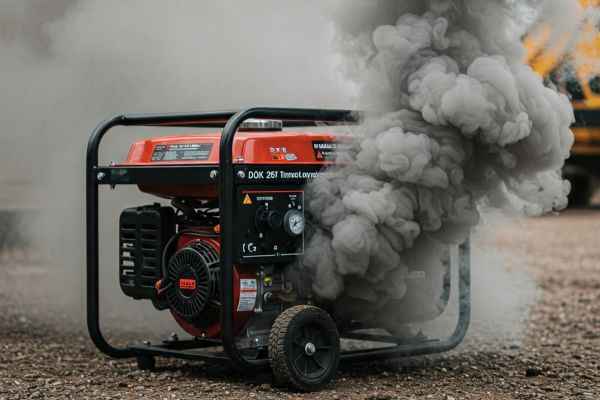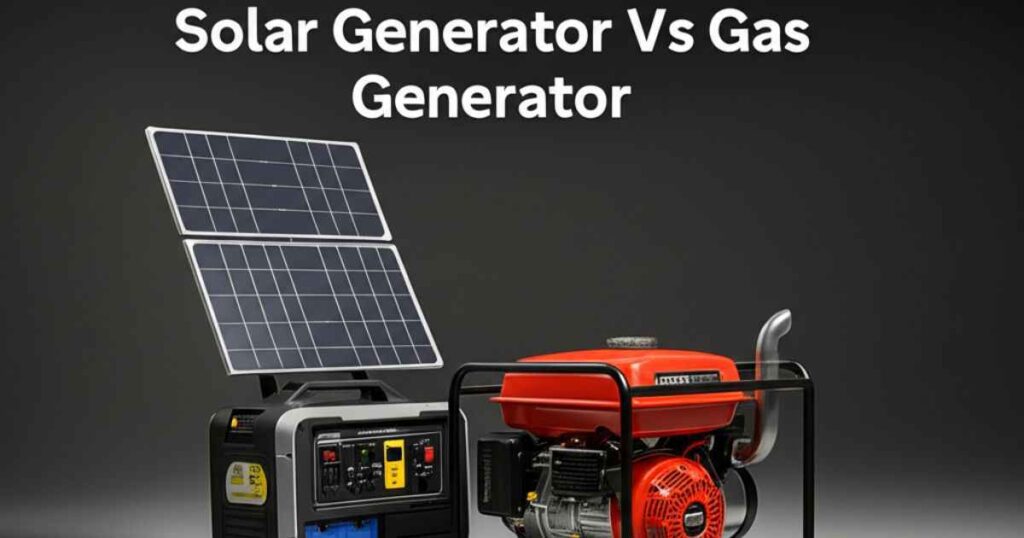Disclaimer: This post contains affiliate links. If you buy through these links, we may earn a commission. As an Amazon Associate, I earn from qualifying purchases.
Solar generator vs gas generator — which is better for your backup power needs? With power outages, camping, and off-grid setups on the rise, choosing the right generator has never been more important.
Both solar generators and gas generators offer unique benefits based on your budget, power demands, and lifestyle. If you’re trying to decide between clean energy and fuel-based performance, this guide will help you make the right choice.
In this article, we’ll break down the key differences in the solar generator vs gas generator debate, covering how they work, pros and cons, costs, maintenance, and the best use cases for each.
What Is a Solar Generator?
In the solar generator vs gas generator comparison, understanding how solar generators work is essential. A solar generator is a portable power system that captures sunlight through solar panels and stores it in a built-in battery for later use. It provides clean, renewable energy without relying on fossil fuels.
The main components of a solar generator include solar panels, a charge controller, a battery, and an inverter. The panels collect solar energy, the controller manages the charging process, the battery stores power, and the inverter converts it into usable electricity for your devices.
Solar generators are incredibly versatile and serve a variety of needs. They’re a popular choice for home backup power during outages, offering a clean and quiet alternative to gas. Outdoor enthusiasts also use solar generators for campers and RV trips, where portability and silent operation are essential.
Compact models like 1000W solar generators are great for running small appliances, while emergency solar generators provide reliable power without fumes or noise during unexpected situations.

Looking for the Best Solar Generators?
1. Jackery Explorer 1000 – Lightweight & Powerful
The Jackery Explorer 1000 v2 is a powerful 1070Wh LiFePO4 solar generator with 1500W AC output, ideal for camping, RVs, emergencies, and off-grid living. It features fast 1-hour charging and optional solar panel support for clean, reliable power anywhere.
2. BLUETTI Solar Generator EB3A-Best for Budget Conscious Users
The BLUETTI EB3A solar generator offers 268Wh of LiFePO4 battery power with dual 600W AC outlets (1200W surge), perfect for camping, travel, or emergency use. It recharges from 0–80% in just 30 minutes for quick, reliable backup power.
3. EcoFlow Delta 2 – Fast Charging & Expandable
The EF ECOFLOW DELTA 2 is a 1024Wh portable power station with a durable LiFePO4 battery and 1800W AC output, ideal for home backup, camping, and RVs. It supports fast charging and optional solar panels for clean, off-grid power.
4. Goal Zero Yeti 500X – Great for Outdoor Use
The Goal Zero Yeti 500 is a rugged 499Wh portable solar generator with a water-resistant, dustproof design—perfect for camping, tailgating, and home backup. Its LiFePO4 battery delivers clean, reliable off-grid power wherever you go.
5. Anker SOLIX C1000- Best for Emergency Backup
The Anker SOLIX C1000 is a high-capacity 1056Wh solar generator with 1800W output (2400W peak), fully rechargeable in just 58 minutes. It’s perfect for home backup, power outages, and outdoor camping, with an optional solar panel for clean energy on the go.
What Is a Gas Generator?
In the solar generator vs gas generator debate, gas generators are the traditional go-to for reliable backup power. A gas generator converts mechanical energy into electricity using an internal combustion engine.
These generators typically run on gasoline, propane, or diesel. Some models are dual-fuel, offering more flexibility during emergencies or fuel shortages.
Gas generators are known for delivering high power output. They’re widely used for home backup, construction sites, outdoor events, and areas with frequent outages. Larger units can run multiple appliances, while smaller portable models are perfect for tools or RVs.
With fast startup and the ability to power heavy-duty devices, gas generators remain a popular choice where quick and strong electricity is needed

Looking for the Best Gas Generators?
The Honda EU2200i is a quiet, fuel-efficient inverter generator perfect for camping, tailgating, and emergencies. Its compact design makes it easy to carry and reliable in any situation.
2. The Oxseryn 2500W Portable Inverter Generator
The Oxseryn 2500W inverter generator is best for home backup, camping, and emergencies—offering quiet operation, long runtime, and built-in CO sensor for safe, reliable power.
The Westinghouse 4650W portable generator is best for RVs, home backup, and outdoor use, featuring a 30A RV-ready outlet, gas power, and a CO sensor for safe, dependable operation.
The WEN 5600-Watt Portable Generator (GN5600) is powered by a 224cc engine, featuring a transfer switch and RV-ready outlets, making it ideal for home backup and outdoor use.
The GENMAX Generator is EPA compliant, ultra-lightweight, and features an eco-mode, making it perfect for backup home use and camping with efficient, portable power.
Key Differences Between Solar and Gas Generators
Features | Solar Generators |
Gas Generator
|
Power Output | Typically lower (up to 2000W–3000W); ideal for small to medium loads | Higher power output (2000W to 10,000W+); supports heavy appliances |
Fuel/Energy Source | Uses solar panels and stores energy in batteries | Uses gasoline, diesel, or propane |
Portability | Lightweight and easy to carry; great for camping | Heavier but often comes with wheels for mobility |
Runtime | Lightweight and easy to carry; great for camping | Heavier but often comes with wheels for mobility |
Maintenance | Low maintenance; fewer moving parts | Requires regular oil changes and engine upkeep |
Noise Level | Virtually silent operation | Noisy, even with inverter models |
Environmental Impact | Clean, renewable energy; zero emissions | Produces carbon emissions and fumes |
Solar Generator Pros and Cons
✅ Solar Generator Pros
- Clean Energy: Runs on renewable solar power with zero emissions
- Silent Operation: No noise, ideal for indoor or nighttime use
- Low Maintenance: Fewer moving parts mean less upkeep
❌ Solar Generator Cons
- Limited Power Output: Not suitable for heavy-duty appliances
- Relies on Sunlight: Charging depends on weather and sunlight availability
Gas Generator Pros and Cons
✅ Gas Generator Pros
- High Power Output: Handles large appliances and power tools easily
- Runs Anytime: Operates day or night, regardless of weather conditions
❌ Gas Generator Cons
- Noisy Operation: Produces significant noise during use
- Emits Fumes: Releases carbon emissions; not ideal for indoor use
- Fuel & Maintenance Needed: Requires regular refueling, oil changes, and upkeep
Which Generator Should You Choose?
Choosing between a solar generator vs gas generator depends on your intended use, power requirements, and long-term cost expectations. Each option has clear advantages in different scenarios.
For Home Backup
If you need to power large appliances like refrigerators, sump pumps, or air conditioners during outages, a gas generator is often the better choice. It provides higher wattage and can run continuously with enough fuel.
However, solar generators for home backup are becoming more popular for powering essentials like Wi-Fi routers, LED lights, CPAP machines, and small electronics without fumes or noise. They’re perfect for eco-conscious homeowners in areas with frequent sunshine.
For Outdoor Use (Camping, RVs)
A solar generator is ideal for campers and RV users. They’re quiet, lightweight, and don’t require fuel—great for charging phones, cameras, mini-fridges, or fans during remote trips.
Popular portable power stations like the Jackery 1000 or Bluetti EB3A offer reliable off-grid power with clean energy. Gas generators, though powerful, are noisy and less convenient for quiet campsites.
For Emergencies
During extended blackouts or natural disasters, a gas generator ensures uninterrupted power as long as you have fuel. It can support high-energy appliances and provide immediate relief.
However, emergency solar generators are a safe and silent option when fuel is unavailable or you’re indoors. They can keep communication devices, medical equipment, and lighting running reliably.
Based on Budget and Energy Needs
Gas generators are typically more affordable upfront, especially for high-wattage needs, but fuel and maintenance costs add up over time.
Solar generators have a higher initial cost, especially when bundled with solar panels, but they require almost no maintenance and no ongoing fuel expenses—making them cost-effective in the long run.
Ultimately, the decision between a solar generator vs gas generator should align with your power needs, noise tolerance, environmental concerns, and whether you prefer a one-time investment or are okay with recurring fuel costs.
Final Verdict: Which One Is Right for You?
When comparing a solar generator vs gas generator, the best choice depends on how and where you plan to use it.
A solar generator is perfect for those who value clean energy, quiet operation, and minimal maintenance. It’s ideal for camping, RV trips, small emergency backups, and eco-friendly home use—especially in areas with good sunlight.
On the other hand, a gas generator is better suited for high-power demands, extended home outages, and emergency situations where fuel is accessible. It’s a reliable option for powering large appliances and heavy-duty tools.
Ultimately, the solar generator vs gas generator debate comes down to your specific needs, budget, and usage preferences. Consider what matters most—convenience, power output, portability, or sustainability—before making your decision.
FAQs: Solar Generator vs Gas Generator
Can a solar generator power a whole house during an outage?
Most solar generators can handle small appliances, but powering an entire home requires a high-capacity model or multiple units.
Is a gas generator better than a solar generator for emergencies?
Gas generators offer higher power output and are great for emergencies, but solar generators are safer and quieter for indoor use.
Are solar generators safe to use inside the house?
Yes, solar generators emit no fumes and are completely safe for indoor use, unlike gas-powered units.
How long does a solar generator last compared to a gas generator?
Solar generators typically last 10–25 years with minimal maintenance, while gas generators may require frequent servicing and last around 5–10 years.
Which is more cost-effective: solar generator vs gas generator?
Gas generators have a lower upfront cost, but solar generators save more in the long run with no fuel costs and less maintenance.

